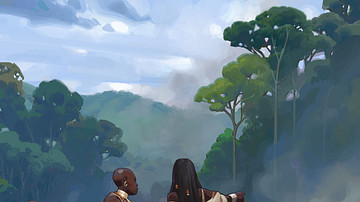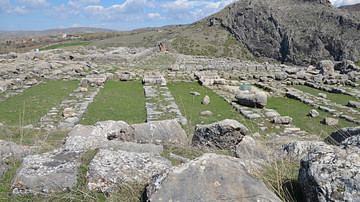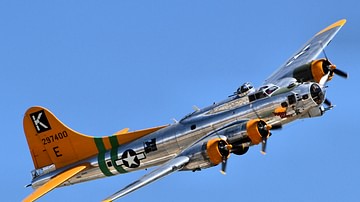Search
Search Results

Definition
Babylon
Babylon is the most famous city from ancient Mesopotamia whose ruins lie in modern-day Iraq 59 miles (94 km) southwest of Baghdad. The name is derived from bav-il or bav-ilim, which in Akkadian meant "Gate of God" (or "Gate of the Gods"...

Definition
Byzantine Empire
The Byzantine Empire existed from 330 to 1453. It is often called the Eastern Roman Empire or simply Byzantium. The Byzantine capital was founded at Constantinople by Constantine I (r. 306-337). The Byzantine Empire varied in size over the...

Definition
Black Death
The Black Death was a plague pandemic that devastated medieval Europe from 1347 to 1352. The Black Death killed an estimated 25-30 million people. The disease originated in central Asia and was taken to the Crimea by Mongol warriors and traders...

Definition
Bantu Migration
The Bantu migration from their origins in southern West Africa saw a gradual population movement sweep through the central, eastern, and southern parts of the continent starting in the mid-2nd millennium BCE and finally ending before 1500...

Definition
Book of Revelation
The book of Revelation or the Apocalypse of John of Patmos is one of the most famous books in the New Testament. Written near the end of the 1st century CE, it is the only apokalypsis (Greek: "unveiling of unseen realities") that was included...

Definition
Bronze Age Collapse
The Bronze Age Collapse (also known as Late Bronze Age Collapse) is a modern-day term referring to the decline and fall of major Mediterranean civilizations during the 13th-12th centuries BCE. The precise cause of the Bronze Age Collapse...

Definition
British Industrial Revolution
The British Industrial Revolution (1760-1840) brought innovative mechanisation and deep social change. The process saw the invention of steam-powered machines, which were used in factories in ever-growing urban centres. Agriculture remained...

Definition
Buddhism
Buddhism is a non-theistic religion (no belief in a creator god), also considered a philosophy and a moral discipline, originating in the region of modern-day India in the 6th and 5th centuries BCE. It was founded by the sage Siddhartha Gautama...

Definition
Beowulf
Beowulf is an epic poem composed in Old English consisting of 3,182 lines. It is written in the alliterative verse style, which is common for Old English poetry as well as works written in languages such as Old High German, Old Saxon, and...

Definition
B-17 Flying Fortress
The Boeing B-17 Flying Fortress was a four-engined heavy bomber plane used by the air forces of the United States and Britain during the Second World War (1939-45). The B-17 had unusually heavy defensive armament, 13 machine guns in total...